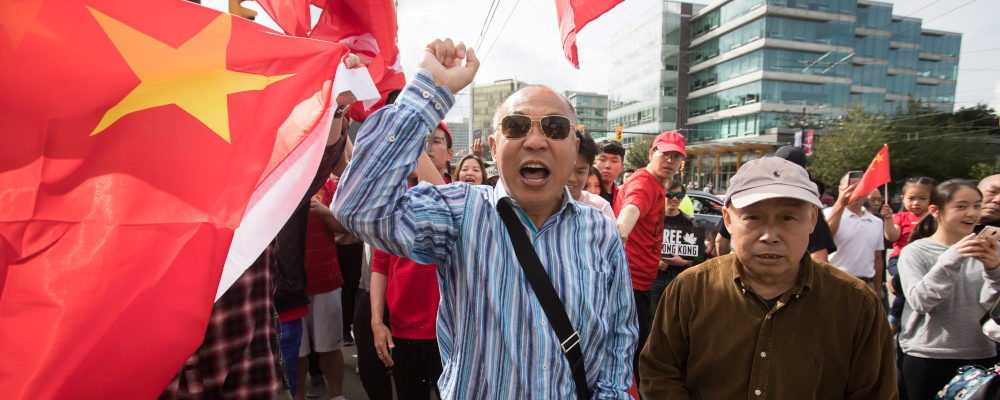On September 24, 2021, while most Canadians were relieved to learn of the release of the two Michaels after over 1,000 days of detention in China, posts on the popular Chinese social media WeChat shared by some of my Chinese Canadian friends told a vastly different version of the story.
Parroting the nationalistic rhetoric commonly found in Chinese state media, they cheered with genuine enthusiasm the release of Huawei’s Meng Wanzhou (instead of the two Michaels), whom they believed to be the victim of a political prosecution led by the U.S.
To them, her release signaled the display of rising Chinese power on the international stage and their pride of coming from such a powerful country. Their legal status as permanent residents or citizens of Canada were secondary to and separate from their nationalistic identities as Chinese.
Due to a combination of language barrier and cultural affinity, a large number of Chinese Canadians and immigrants still consume exclusively or predominately Chinese-language media and social media here in Canada. This is no small matter as Mandarin is now the largest non-official language spoken in Canada (followed by Cantonese), according to the 2016 Census by Statistics Canada.
As Beijing works to tighten its grip on Chinese-language media outside of China through government organizations like the United Front Work Department, those segments of new immigrants and Chinese Canadians remain susceptible to CCP-directed misinformation and propaganda. Despite being outside of the Chinese Great Firewall, it’s as if they are still living in a filter bubble or a world with “alternative facts” distinct from the rest of Canada.
As a result, they are particularly prone to exploitation by the Chinese government and pressured to exert foreign interference in Canada. Or, out of nationalistic convictions, they are induced to voluntarily do its bidding by cancelling or reporting public criticisms of the Chinese Communist Party and its policies.
Canadians should be gravely concerned about these threats to academic freedom, freedom of speech, and the independence of our media.
Of course, not all Chinese Canadians are ardent nationalists. The ethnically Chinese diaspora in Canada is far from monolithic, with different generations of immigrants from Hong Kong, Taiwan, various parts of mainland China, as well as other Asian countries such as India, Malaysia or Vietnam. On the contrary, some Chinese Canadians are the toughest critics of the CCP (such as the followers of Falun Gong), having been on the receiving end of the Chinese government’s political oppressions and human rights violations. However, these liberal-minded Chinese people not only find themselves increasingly censored in China, but face similar threats by their Chinese peers here in Canada as well.
Back in the pre-COVID days of August 2019, a few hundred Hong Kong Canadians and their supporters gathered outside of the Old City Hall in Toronto to march in support of pro-democracy protests in Hong Kong. They were soon stopped by a group of Chinese counter-protestors, who saw the pro-democracy protests as an attempt to assert Hong Kong independence and a grave assault to the integrity of the Chinese sovereignty.
A similar instance occurred in the same year at University of Toronto-Scarborough, when Chemi Lhamo, a Tibetan-Canadian student-union president received verbal threats and online attacks by other Chinese students for her activism work with Free Tibet. In British Columbia, former editor-in-chief of Global Chinese Press Inc. Lei Jin was fired from his job for simply writing about the death of Liu Xiaobo, the Nobel Peace Prize laureate and critic of the one-party rule in China.
Cases like these create an atmosphere of fear for any Chinese Canadians and immigrants with some financial or family ties in China, particularly those from Hong Kong given the new National Security Law implemented in the region. Should they be reported to the Chinese embassy or consulate for critical speech on China, they could be subjected to harassments and surveillance even while in Canada, or risk their family members in China being visited by the local police.
This is all happening in Canada — a free and democratic nation with legal protection of individual rights. Canadians should be gravely concerned about these threats to academic freedom, freedom of speech, and the independence of our media. Any potential means of foreign interference must be thoroughly investigated.
That said, a Red Scare return to the Cold War-style McCarthyism is not the solution. Targeting Chinese Canadians and immigrants broadly based on their ethnicity not only ignores the diversity of opinions within the communities, but would also aggravate existing anti-Chinese prejudice. Worse yet, the approach risks playing into the hands of the CCP’s propaganda regarding the presence of anti-China forces in the West, thus further fueling the nationalistic fervor.
For context, the Chinese government has been clever to deflect any criticisms of its government policies in Western media as part of the insidious “foreign anti-China hostile forces” or “anti-China propaganda” aimed to constrain China’s rise. To prevent another “century of humiliation” at the hands of Western powers, as the narrative goes, the antidote is to flex China’s strength and power on the global stage—militarily, politically, and economically. Viewed from this perspective, the country’s aggressive approach to foreign policy under Xi Jinping, known as “wolf warrior diplomacy”, has great appeal amongst Chinese citizens, as well as many first-generation Chinese Canadians and immigrants from mainland China.
In keeping with the Chinese government’s concerted efforts to conflate concepts of party, country, and personal identity, any criticism of the CCP or its policies can be taken by them as xenophobic comments against China, or racist affronts to their cultural identity. These accusations are often mixed together with actual instances of anti-Chinese racism and discrimination (also on the rise since the COVID outbreak), making the latter cases even harder to address.
Instead of borrowing the CCP’s tactics of silencing and marginalizing differing views, more efforts should be made to better understand and engage with the diverse Chinese Canadian and immigrant communities in order to amplify and protect the critical and divergent opinions within. Chinese Canadian journalists, writers, students, scholars, businesspeople or regular citizens should not have to fear censorship and retaliation by the CCP should they criticize its policies, nor should they be ostracized or accused as “China Sympathizers” if they speak positively about China.
It’s not about picking sides in the great power conflict between the U.S. and China, a crossfire in which Canada and Chinese Canadians alike are caught between. But rather it is about the protection of freedom of speech for everyone in Canada so that all sides can compete equally in the marketplace of ideas.




